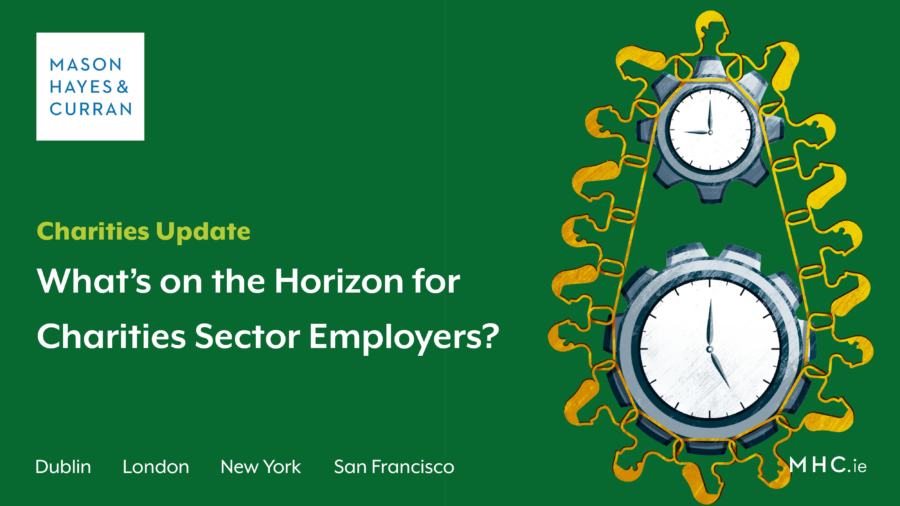
As workers across Ireland gradually transition back to the physical workplace, it is essential for all employers, including charitable organisations, to be aware of what is coming down the tracks in 2022.
Here is a summary of the main anticipated changes in the Irish employment law landscape which are likely to take effect this year.
Remote working
Under the Government’s draft Right to Request Remote Working bill, employees will have a statutory right to request remote working and employers will have to follow a statutory process when dealing with such requests, within certain timelines. Employers will also have to put in place a remote working policy.
Sick leave
At the moment, there is no statutory obligation on employers to pay employees who are absent from work on sick leave – whether certified or uncertified. New legislation will provide for:
- The introduction of statutory sick pay scheme.
- A requirement for employers to pay sick pay at a rate of 70% of an employee’s wage, subject to a daily threshold of €110.
- It is proposed to phase the sick pay scheme in over a four-year period as follows:
- three days per year in 2022
- five days in 2023
- seven days in 2024
- 10 days in 2025
Public holidays
From 2023 the first Monday in February will be a public holiday. However, should the 1st day of February happen to fall on a Friday, then Friday 1 February will be a public holiday.
Whistleblowing
New Protected Disclosures legislation, once enacted, will:
- Expand the ambit of “relevant wrongdoings”
- Apply to volunteers, interns, job applicants, suppliers, shareholders and non-executive directors
- Exclude interpersonal grievances from “relevant wrongdoing”
- Require that employers with 50 – 250 employees establish whistleblowing procedures and internal channels
Maternity
Time off for breastfeeding breaks is to be extended to 2 years.
Transgender men who have obtained a gender recognition certificate under the Gender Recognition Act 2015 and later give birth would also be entitled to maternity leave.
Predictable working conditions
All workers will have the right to more complete information on the essential aspects of the work the undertake. It includes:
- Placing a six-month cap on probationary periods, except in exceptional circumstances
- Preventing employers from disallowing an employee from working for another employer outside work hours or penalising them for doing so
- Setting minimum conditions for the predictability of work
- Providing that after six month’s service an employee can request a form of employment with more predictable and secure working conditions
Redundancy
Certain lay-off periods between 13 March 2020 and 30 September 2021 as a result of COVID-19 will be reckonable for the purposes of calculating an employee’s statutory redundancy entitlement.
Gender Pay Gap reporting
Regulations implementing gender pay gap reporting in Ireland have just been published which provide that employers with 250 employees or more in 2022 will have to report:
- The hourly wage gap between men and women for full-time employees, part-time employees, and employees on temporary contracts
- The differences between average bonus remuneration of male and female employees
- The percentage of male and female employees who received bonuses
- The percentage of male and female employees who received benefits-in-kind
- The percentages of male and female employees in the lower, lower middle, upper middle and upper quartile pay bands
Where differences exist, employers will have to provide an opinion for the reasons for such a pay gap and the measures (if any) proposed to be taken by the employer to eliminate or reduce such differences.
Conclusion
Most of the anticipated changes in employment law coming in 2022 will require employers to consider and amend their existing policies. Expert legal advice should always be sought to ensure your organisation is fully compliant with the relevant legislation.
Contact a member of our Employment & Benefits team if you wish to discuss the likely impact of these changes on your organisation.
The content of this article is provided for information purposes only and does not constitute legal or other advice.
Share this:




